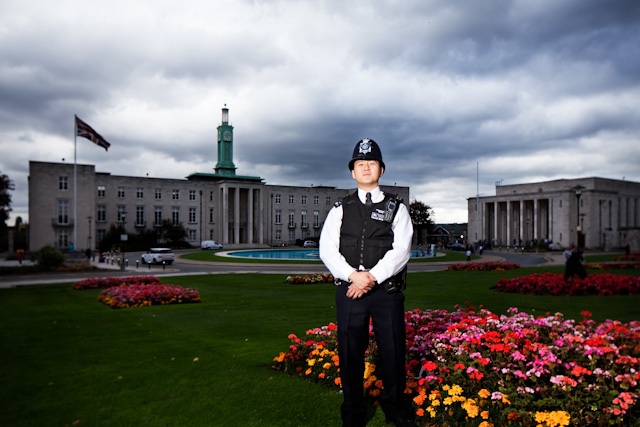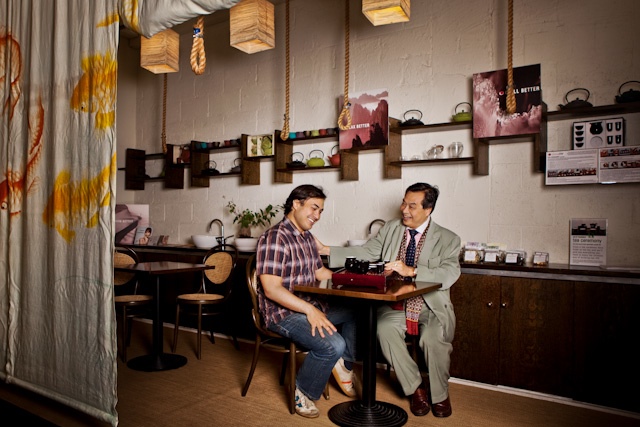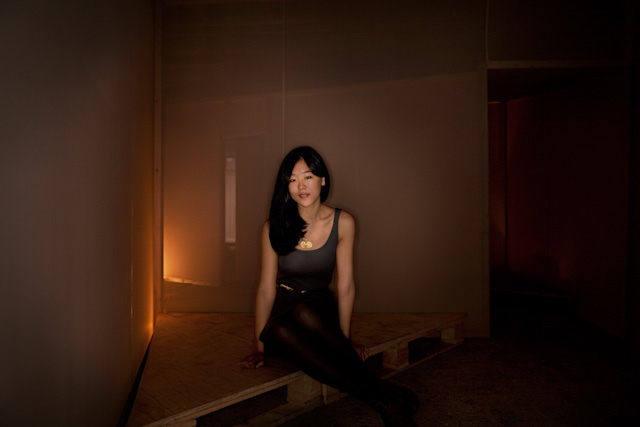In-depth interview: Photographer Mike Tsang on the blessing and the curse of growing up a Chinese Londoner
Mike Pollitt | Thursday 1 November, 2012 11:51

I asked Mike, who himself comes from Harrow and has Chinese heritage, what the project tells us about China, what global migration does to culture, and whether being caught in the middle is a blessing or a curse.
Snipe: Your exhibition is about China and Britain and the people in between. People like William Wong (pictured above), who describes his mother growing up in a family of subsistence farmers in a village in Hong Kong. He now lives in Enfield and is a PC in the Met Police. That’s a staggering change to have taken place over just one generation. Do you feel that it stretches cultural identities and traditions to breaking point? How do people deal with that sort of rupture?
Mike Tsang: It’s certainly a huge change to take place over one generation, and I think that’s one of the challenges that all first-generation communities have to face – how to communicate with their children who are “in between”. Growing up I sometimes felt the difference in culture between my friends at school and that of my parents. Both of my parents had quite an impoverished upbringing as my father was from a family of 13 children and my mother from one of ten. So most arguments would come from their perspective of me taking our relative prosperity for granted, and me not understanding why I couldn’t have more personal freedom.
I don’t think it stretches identities to breaking point, but it can definitely cause tension unless you’re actively aware of it – Stephen Hoo in his interview spoke of a conscious decision he made as a teenager to find out more about both his Chinese and British sides. As I grew older, I think my parents and I have tried to understand each others’ viewpoints better which has brought us closer together.
Snipe: You also spoke to Don Mei (pictured below), who remembers as a child in bed late at night hearing his father downstairs desperately practising his English – striving to integrate himself to his new home. Immigrating to the UK at that time was a great struggle as well great opportunity. Is that experience, that struggle, something that the first or second generation of British Chinese can relate to?
Mike Tsang: I think all can relate to that struggle, but it’s important to remember that the Chinese diaspora is varied and so experiences will be too. For example my parents learnt English at school in Mauritius before it was independent from British rule, so acclimatisation in terms of learning the language was easier for them. Emotionally though, I think the struggle is more universal. My father remembers crying when he left home when he was 20yrs old to go to the UK – he knew he wouldn’t see his family for a long time after that as there wasn’t the kind of affordable air travel that exists now. He didn’t return for over ten years, so he must have felt quite isolated for some time starting out in the UK.

Snipe: China is a country that a lot of Westerners don’t really know what to do with – it’s a place that seems very big but also very far away. Can you talk about how you think China is perceived here and how the lives and experiences of your subjects feed in to that.
Mike Tsang: A tricky question! I think the popular stereotypes about the Chinese are well-known – we all practise kung fu, eat with chopsticks and perform Chinese opera. We might even have a relative here illegally selling DVDs! In all seriousness though, I think China is still very much seen as the exotic ‘Other’ for a lot of British people. Some interview subjects said they feel less accepted as a ‘British’ person than say, a person of Black or Indian origin. I hope that this exhibition can share the stories of these British Chinese and people reading about this project can learn more about their rich heritage and see how that is part of Britain today.
Snipe: How specific is the story of Chinese immigration? Can we compare these stories to West Indian immigrants from the same period, to Eastern European immigrants today? Do you think there’s a universal narrative of immigration?
Mike Tsang: I definitely feel like there are themes in this project which are similar to other migrant communities. I grew up in Harrow in Greater London, which has one of the highest population of Indian, Pakistani and Sri Lankan origin in the UK. Many of my friends’ families had emigrated from there. We felt a common bond from the experience of being the children of parents who had moved here, and even now we’re all very close. I would love to do a follow-up project with a different group of peoples and see how true that idea is!
Snipe: Your subjects are of two cultures, or more than two in some cases. Yet at the same time, they have had to confront the idea that they are neither “properly Chinese” nor “properly British.” Several of them say that their inability to speak Chinese made it hard for them to feel fully Chinese, while the fact that they were not white made it hard to feel fully British. Are these attitudes changing? Has the richness of their heritage ultimately been a blessing, a curse, or something else?
Mike Tsang: From my own childhood I thought it was a curse whilst growing up but now I see it as a blessing. As a child I wanted to fit in but physically I looked different. I think with maturity, and living in a international city, you start to appreciate the advantages of being able to relate to more than one culture. The positive responses we’ve had to the project from people outside of the British Chinese sphere illustrates that: people are fascinated with the richness of the subjects’ heritage as they make for great stories.

Artist Zoe Chan, whose grandfather worked in China as a carrier of precious metals
Snipe: Finally, you’re a photographer and your exhibition includes photography. But there’s also oral history, archive imagery, a website with audio recordings…does this sort of holistic, multi-media approach suggests ways that photographers and artists might present their work in the future? Is the time passing when you could tell these sort of stories with photography alone?
Mike Tsang: There will always be a place for great photography but I think with the saturation of digital imagery that the public are exposed to, it is much more difficult to catch someone’s attention with just one image. The ‘holistic’ approach to this project comes from wanting to make the subject interesting and accessible to people. I’ve seen a lot of great heritage projects that have very valuable content but through a lack of visuals, audio etc do not reach out to people, which is a shame. It also stems from my own interest – I like stories first and foremost, and I think you can get a much more immersive experience if you can read and hear the people as well as see them in photographs. As a photographer, I hope to do more work like this in the future, at the intersection of arts and heritage.
See other in-depth London interviews:
Iain Sinclair and Andrew Kötting on their Olympic pedalo film Swandown
Kate Flowers of CoOperaCo on her mutualised operatic finishing school
Stratford filmmaker Winstan Whitter on what got lost in the gentrification of Dalston
Snipe Highlights
Some popular articles from past years
- Only 16 commuters touch in to Emirates Air Line, figures reveal
- 9 poems about London: one for each of your moods
- Punk brewery just as sexist and homophobic as the industry they rail against
- Summer Camp: Roll out those lazy, hazy, crazy days
- Diary of the shy Londoner
- An interview with Desiree Akhavan
- Nice Interactive timeline lets you follow Londoners' historic fight against racism
- Silencing the Brick Lane curry touts could be fatal for the city's self-esteem
- The five spookiest abandoned London hospitals
- Could red kites be London's next big nature success story?
© 2009-2026 Snipe London.
